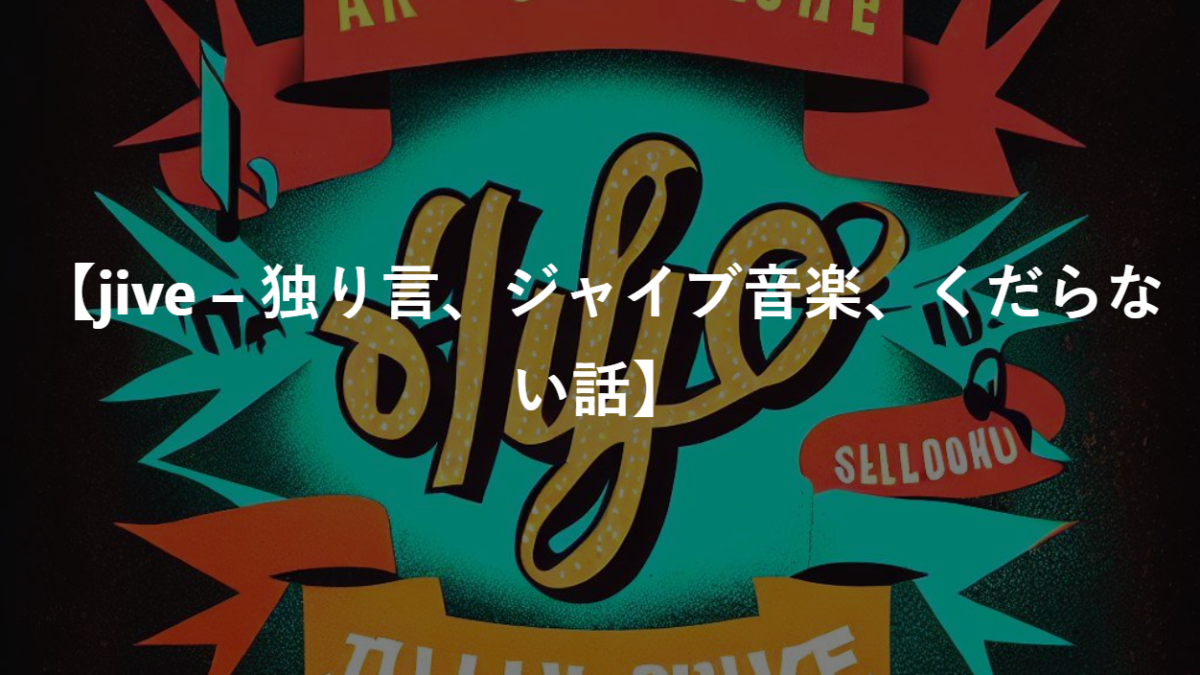語源・類義語・反対語・例文
【jive – 独り言、ジャイブ音楽、くだらない話】という単語の語源とか由来を知っていますか?
“Jive”は1930年代のアメリカで生まれたスラングで、その起源はジャズ時代にさかのぼります。もともとアフリカ系アメリカ人の音楽シーンで使われ始めたこの単語は、特にジャズやスウィング音楽と関連していました。”Jive”は、特定の種類のリズミカルな音楽やダンス、特にジャイブ音楽やダンスを指すようになりましたが、それと同時に、非難や意味のない話、または欺瞞を意味するスラングとしても使われるようになりました。
この用語の語源は完全には明らかではありませんが、”jive”はアフリカ系アメリカ人の俗語や隠語から派生したとされています。音楽とダンスの文脈で「ジャイブ」という単語が使われるようになった一方で、日常会話では「くだらない話」や「だますこと」を意味する言葉としても使われるようになりました。そのため、「jive」には複数の意味があり、文脈によって異なる解釈が可能です。
The term “jive” originated in the 1930s in America, tracing back to the jazz era. Initially used within the African American music scene, the word was particularly associated with jazz and swing music. “Jive” came to denote a specific type of rhythmic music or dance, particularly jive music and dance, but simultaneously, it began to be used as slang for criticism, meaningless talk, or deceit.
The exact origin of the term is not entirely clear, but “jive” is believed to have derived from African American vernacular or jargon. While the word adopted a musical and dance context as “jive,” in everyday conversation, it also came to signify “nonsensical talk” or “deception.” Thus, “jive” carries multiple meanings and can be interpreted differently depending on the context.
この単語の類義語・反対語を教えてください。
類義語
- Jive (音楽/ダンス)
- Swing: スウィング(ジャズ音楽の一種)
- Boogie: ブギ(リズミカルなダンス音楽)
- Bebop: ビバップ(ジャズの一形態)
- Jive (くだらない話)
- Nonsense: 無意味な話
- Gibberish: たわごと
- Baloney: ナンセンス、ばかげた話
反対語
- Jive (音楽/ダンス)
- Classical: クラシック(音楽のジャンルとしての反対)
- Ballad: バラード(ゆったりとした音楽形式)
- Jive (くだらない話)
- Truth: 真実
- Fact: 事実
- Sense: 分別、意味
この単語に似た単語で間違いやすい単語はありますか?
- Jive vs. Jibe:
- Jive: 「独り言、ジャイブ音楽、くだらない話」などを意味します。
- Jibe: 「意見が一致する、合致する」という意味ですが、音が似ているため混同されやすいです。また、海洋用語としては、「(船の帆が)風の向きに合わせて変わる」を意味します。
- Jive vs. Dive:
- Jive: 「ジャイブ」は音楽やダンス、話題などを指します。
- Dive: 「潜る、飛び込む」という意味や、「(質の低い)バー」を意味します。発音が似ていますが、意味が全く異なります。
- Jive vs. Drive:
- Jive: 「くだらない話」や「音楽のスタイル」を意味します。
- Drive: 「運転する、駆り立てる」という意味です。こちらも発音が似ていますが、全く異なる概念を表します。
この単語を使った例文を5つほど教えてください。
He often jives to the rhythm of his favorite songs, lost in his own world.
(彼はよくお気に入りの曲のリズムに合わせてジャイブし、自分だけの世界に浸っています。)
The party had a great atmosphere with live jive music and people dancing energetically.
(パーティーは生のジャイブ音楽と活気溢れる踊りで素晴らしい雰囲気でした。)
Don’t pay attention to his jive. He’s just telling tall tales.
(彼のくだらない話に注意しないでください。彼は嘘をついているだけです。)
The comedian entertained the audience with his witty jive and hilarious anecdotes.
(そのコメディアンは機知に富んだくだらない話と面白い逸話で観客を楽しませました。)
She dismissed his excuses as mere jive and insisted on the truth.
(彼女は彼の言い訳を単なるくだらない話として退け、真実を主張しました。)
【jive – 独り言、ジャイブ音楽、くだらない話】のコロケーション
- Talk jive: くだらない話をする。人が意味のない話や、理解しがたい話をする状況を指します。特に、相手を欺くためや、単に時間を過ごすために使われることがあります。
- Jive music: ジャイブ音楽。スウィング音楽の一種で、リズミカルで踊りやすい特徴があります。ジャズの影響を受けたこの音楽は、1930年代と1940年代に特に人気がありました。
- Dance to the jive: ジャイブに合わせて踊る。ジャイブ音楽に合わせて行う、活発でテンポの速いダンスを指します。このダンスは、リズム感を強調し、エネルギッシュなステップが特徴です。
- Jive talking: くだらない話をすること、または欺くこと。人々が真実ではない情報を伝えたり、意図的に相手を混乱させたりする行為を指します。
- Cut the jive: くだらない話をやめる。不真面目な話や無意味な会話から真面目な話題や内容に切り替えることを促す表現です。
「jive」という言葉は、様々な文脈で使われ、それぞれ異なる意味を持ちます。この多様性は、「jive」が持つユニークな背景と文化的背景に由来します。
まず、「Talk jive」という表現では、人が意味のない話や、理解しにくい話をする状況を指します。これは、しばしば相手を欺くためや、気軽に時間を過ごすために使われる言葉です。この用法では、話の内容が真剣でないか、あまり価値がないことを示しています。
次に、「Jive music」に関しては、これはスウィング音楽の一種を指し、リズミカルで踊りやすい特徴があります。1930年代と1940年代にかけて特に人気を博したジャイブ音楽は、ジャズの影響を受け、活発なダンス文化を生み出しました。
「Dance to the jive」は、そのリズミカルなジャイブ音楽に合わせて踊ることを意味します。このダンスは、そのエネルギッシュな動きとテンポの速さで知られ、ダンサーに高いリズム感を要求します。
「Jive talking」は、くだらない話をすることや、人を欺くことを意味します。この表現は、不真面目な会話や誤解を招くような発言を指すときに用いられます。
最後に、「Cut the jive」というフレーズは、無意味な話や不真面目な態度から真面目な話題へと移行するよう促す時に使われます。これは、会話をより建設的で意味のある方向へ導くよう求める表現です。
これらのコロケーションを通じて、「jive」という単語がいかに多面的に使われているかが明らかになります。音楽やダンスの文脈から、非真面目な会話や欺瞞に至るまで、「jive」は多様なシナリオで活用されています。
The term “jive” is used in various contexts, each carrying different meanings. This diversity stems from the unique background and cultural heritage associated with “jive.”
First, the expression “Talk jive” refers to situations where people engage in meaningless or incomprehensible conversations. Often used to deceive someone or to casually pass time, this usage indicates that the content of the conversation is not serious or of little value.
Next, regarding “Jive music,” this term denotes a type of swing music known for its rhythmic and danceable characteristics. Jive music, particularly popular during the 1930s and 1940s, was influenced by jazz and spawned a lively dance culture.
“Dance to the jive” signifies dancing to this rhythmic jive music. The dance is known for its energetic moves and fast pace, demanding a good sense of rhythm from the dancers.
“Jive talking” means engaging in nonsensical talk or deception. This phrase is used when referring to frivolous conversations or misleading statements.
Lastly, the phrase “Cut the jive” is used to encourage a shift from meaningless talk or non-serious attitudes to more serious topics. It urges a transition to more constructive and meaningful dialogue.
Through these collocations, it becomes clear how multifaceted the word “jive” can be used. From musical and dance contexts to non-serious conversations and deceit, “jive” is utilized in a variety of scenarios.
文法問題: “jive” (独り言、ジャイブ音楽、くだらない話)
- 品詞と使い方:
The teenagers were dancing to the upbeat _________ music at the club.
(A) jive
(B) jives
(C) jived
(D) jiving
解答と解説: (A) jive 空欄には名詞 music を修飾する形容詞が必要です。jive は「ジャイブ音楽の」という意味の形容詞として使われます。
– - 動詞形:
The two friends were _________ about their weekend plans.
(A) jive
(B) jives
(C) jived
(D) jiving
解答と解説: (D) jiving 空欄には be 動詞の後に続く動詞が必要です。jiving は「くだらない話をする」という意味の動詞の進行形です。
– - 名詞形:
The politician’s speech was full of _________, and the audience quickly lost interest.
(A) jive
(B) jives
(C) jived
(D) jiving
解答と解説: (A) jive 空欄には主語となる名詞が必要です。jive は「くだらない話」という意味の名詞です。
– - 類義語:
The comedian’s _________ act had the audience in stitches.
(A) jive
(B) nonsense
(C) gibberish
(D) all of the above
解答と解説: (D) all of the above jive, nonsense, gibberish はいずれも「くだらない話」という意味で、この文脈ではすべて適切です。
– - 誤文訂正:
The jives lyrics were catchy, but the meaning was unclear.
解答と解説: jives → jive 歌詞は複数あるのが普通ですが、ここでは歌詞全体を一つのまとまりとして捉えているため、単数形の jive が適切です。

